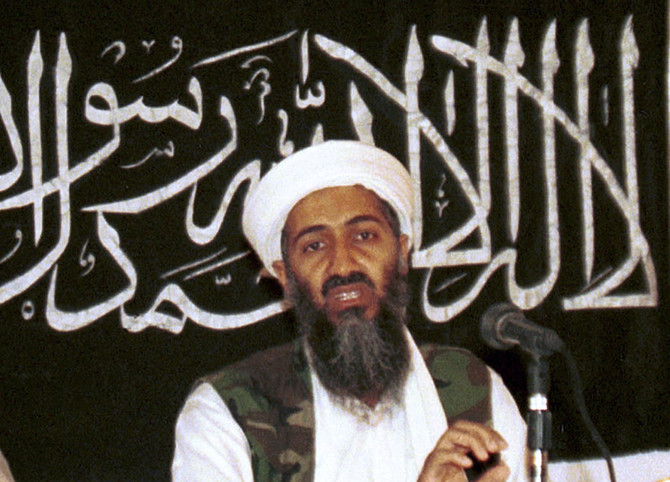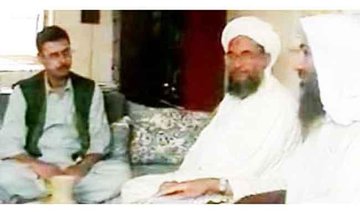WASHINGTON: The CIA on Wednesday released a vast archive of intimate Al-Qaeda documents, including Osama Bin-Laden’s handwritten diary, seized in the deadly 2011 raid on his Pakistani compound.
The huge trove includes images of diary pages left by the Saudi-born global extremist leader and a wedding video that includes the first public images of his son Hamza as an adult.
Controversially, scholars from a Washington think-tank who were given access to the now de-classified trove say the documents also shed new light on Al-Qaeda’s murky relationship with Iran.
“Today’s release ... provides the opportunity for the American people to gain further insights into the plans and workings of this terrorist organization,” said CIA director Mike Pompeo.
The CIA put online 470,000 additional files seized in May 2011 when US Navy SEALs burst into the Abbottabad compound and shot dead the leader of Al-Qaeda’s global extremist network.
According to Thomas Joscelyn and Bill Roggio, scholars from the Foundation for Defense of Democracies who were allowed to see the trove before it was made public, it provides new insights.
“These documents will go a long way to help fill in some of the blanks we still have about Al-Qaeda’s leadership,” Roggio said.
The inclusion of Hamza Bin Laden’s wedding video, for example, gives the world public the first image of Bin Laden’s favorite son as an adult — an image apparently shot in Iran.
Previous document releases, including letters revealed by AFP in May 2015, show that Bin Laden was grooming Hamza to succeed him as leader of Al-Qaeda’s global jihadist campaign.
But plans for him to come to Bin Laden’s Abbottabad hideout seem to have been abandoned after the deadly US raid, and the young man — now aged 27 or 28 — is presumed to be in Iran.
According to Joscelyn and Roggio, writing in the FDD’s Long War Journal, one of the newly released documents is a 19-page study of Al-Qaeda’s links to Iran written by a Bin Laden lieutenant.
Last month, at a seminar hosted by the same FDD that had an advance look at the files, Pompeo had promised to release Abbottabad documents that would show Iran-Al Qaeda ties.
“There have been relationships, there are connections. There have been times the Iranians have worked alongside Al-Qaeda,” the US spy chief argued.
“There have been connections where, at the very least, they have cut deals so as not to come after each other.”
This raised alarm bells among critics of President Donald Trump’s new strategy to counter Iranian influence, wary that hawks like Pompeo may be making a case for war.
The full extent and true nature of this relationship is unclear and a matter of dispute among scholars and policy-makers.
On the one hand, Tehran and its largely Shiite proxy forces in the Middle East often fight against Sunni movements aligned with Al-Qaeda’s deeply sectarian ideology.
The Iranian backed Hezbollah, for example, is locked in conflict against Al-Qaeda linked Syrian rebels.
But the very fact that Hamza and other senior figures appear to be able to live under Iranian protection or custody supports claims that Tehran and Bin Laden had a working relationship.
One document, Joscelyn and Roggio write, recounts how Iran offered training, money and arms to some of Al-Qaeda’s “Saudi brothers” on condition they attack US interests in the Gulf.
But the files also show Tehran and Al-Qaeda sometimes had stark disagreements, and Bin Laden once wrote to Iranian leader the Ayatollah Ali Khamenei to demand his relatives be released.
“Other files show that Al-Qaeda kidnapped an Iranian diplomat in order to force an exchange,” Joscelyn writes.
“Osama bin Laden’s correspondence shows that he and his lieutenants were also concerned that the Iranians would track Hamza or other family members after they were released.”
In addition, Roggio and Joscelyn say, “Bin Laden himself considered plans to counter Iran’s influence throughout the Middle East, which he viewed as pernicious.”
Nevertheless, they argue, analysis of the intelligence points to Al-Qaeda having been able to maintain a “core facilitation pipeline” on Iranian soil.
Some in Washington are skeptical about the motives behind the release, coming after what the intelligence community had previously said was the last dump from the Bin Laden files.
Ned Price, a former CIA official who was seconded as a national security adviser to former president Barack Obama, said the new documents “don’t tell us anything we didn’t already know.”
Instead, he argued on Twitter, Pompeo may have released the files to bolster the case against Iran as a sponsor of terror, pushing the United States closer to open conflict with Tehran.
“These moves suggest he’s reverting to the Bush administration’s playbook: Emphasize terrorist ties as a rationale for regime change,” Price warned.




























